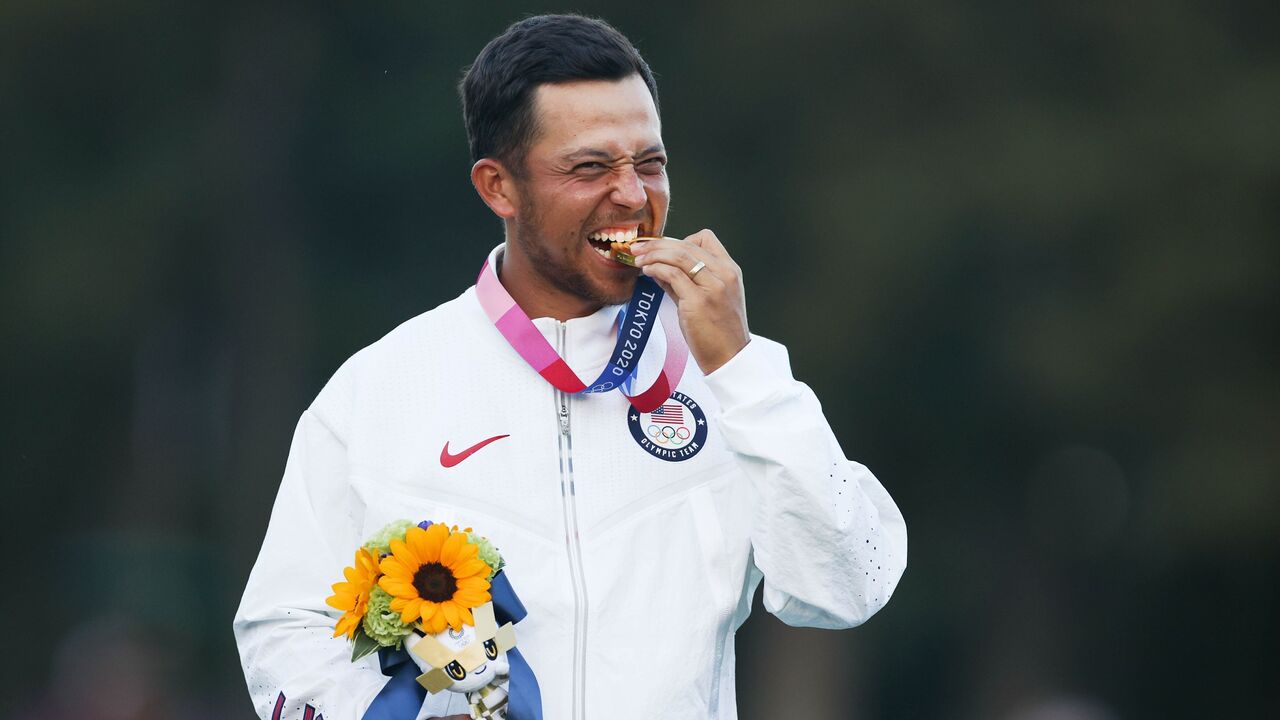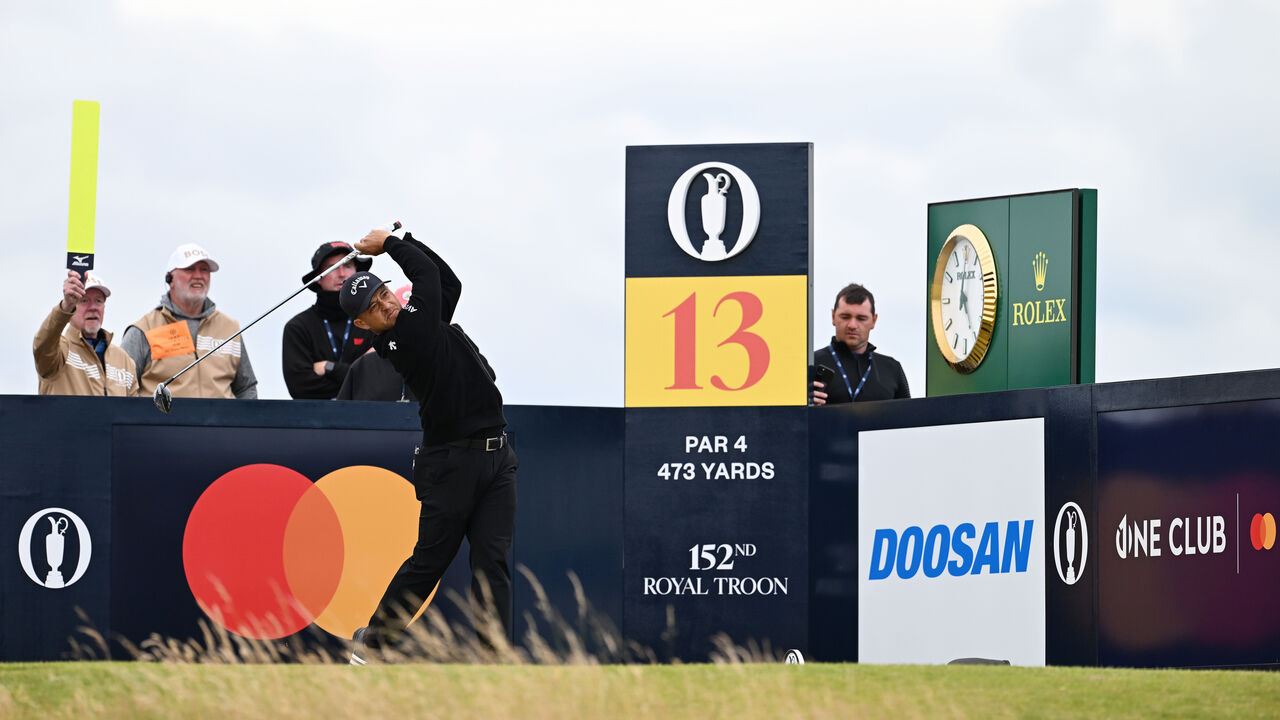How Xander became a 2-time major winner, and why he's far from done
For years, Xander Schauffele was included in conversations about the best players without a major championship.
He's been inside the top 15 on the Official World Golf Ranking since late 2018, he's a multi-time PGA TOUR winner and an Olympic gold medalist, and he's a member of two Ryder Cup and two Presidents Cup teams.
The unwanted label of "best player without a major" was warranted since the talent was so obvious.
But Schauffele quickly removed himself from the conversation by hoisting the Wanamaker Trophy in May and adding the Claret Jug to his mantel. He's now in an elite tier in golf alongside fellow two-time major winners Scottie Scheffler, Jon Rahm, and Bryson DeChambeau, to name a few.
"It's a dream come true to win two majors in one year," Schauffele said in his champion's press conference. "It took me forever just to win one, and to have two now is something else."
As he alluded to, Schauffele's rapid ascension to two majors was a long time coming. At 30, he's somewhat of a late bloomer in terms of major wins, especially in today's game. Spieth, Scheffler, Rahm, Collin Morikawa, and Justin Thomas all claimed their first of two major titles before the age of 27.
Schauffele's journey to the PGA TOUR was different than theirs, though. He didn't attend a big school like Texas or Alabama, was never a top-ranked amateur, wasn't on an American Walker Cup team (the Ryder Cup-style event for the game's elite amateurs), and he wasn't a prolific winner before turning pro. He only won twice in four years of university. (Three of those years were spent at San Diego State, which isn't exactly a golf powerhouse.)
Schauffele took a more traditional route to the PGA TOUR, qualifying for the then-Web.com Tour in his first attempt out of school. He played there in his first year as a pro, with four top-10 finishes in 23 starts, but he never won.
For comparison, Spieth, Rahm, and Morikawa skipped the second-tier circuit thanks to immediate success on the PGA TOUR after earning sponsor's exemptions due to their impressive amateur resumes.
However, Schauffele quickly found success on the top tour once he got there. He won twice in his debut season, became the first rookie to win the TOUR Championship, and claimed the PGA TOUR's Rookie of the Year honors. Schauffele also came T5 at the 2017 U.S. Open in his first career major championship.
But his instant success didn't translate into a flurry of early-career victories. Schauffele only won twice on the PGA TOUR over the next four years, both coming in limited-field, no-cut events, while accumulating several close calls.
He did win the gold medal at the 2020 Tokyo Summer Games, but it's an event that's still trying to figure out where it stands in the sport's hierarchy of prestigiousness.

Gold medal aside, many started to question if Schauffele had what it took to win major championships. He had his first taste of disappointment as a runner-up at the 2018 Open Championship after wilting away during the final round to let Francesco Molinari claim victory.
Schauffele developed more scar tissue after being one of three runners-up to Tiger Woods at the 2019 Masters. He also came T3 two years later at Augusta when he made a triple-bogey on the 70th hole to fall three shots shy of Hideki Matsuyama.
But Schauffele was still compiling an incredible major championship resume. Before this year's PGA Championship, he'd recorded 20 top-20 finishes in 27 majors while notching a top-10 result 44% of the time. Despite the doubters, it felt like it was only a matter of when - not if - his first major title would come.
At the end of 2023, Schauffele found the catalyst for his victories in 2024. After another winless year and a disappointing 1-3-0 showing in the Ryder Cup, Schauffele and his team decided it was time for a different pair of eyes. Schauffele's dad, Stefan, realized he wasn't the one to take his son's game to the next level after being his swing coach his entire life.
So, Schauffele reached out to Chris Como, a renowned swing instructor who previously worked with Woods and DeChambeau. Como's philosophy is to optimize a player's biomechanics to maximize speed, which is exactly what Schauffele accomplished.
When Schauffele arrived on TOUR in 2016, his average ball speed was 174 mph. Schauffele only ranked inside the top 30 in ball speed once over the next six years. This year, he's averaging 183 mph to rank 10th on the PGA TOUR.
He's also gaining the 11th-most strokes off the tee, which is a drastic improvement after he ranked 47th in the same category last season.
What's remarkable is that this transformation hasn't affected any other parts of his game. Many players who've chased speed in the past, most notably Rory McIlroy, have admitted other areas of their game diminished as a result.
Schauffele remains an exceptional iron player (fifth in strokes gained: approach), possesses a tremendous short game (first in scrambling), and is one of the best putters in the world (10th in strokes gained: putting). A very strong case can be made that Schauffele is the world's most complete player.

His new-found speed and power were apparent Sunday at The Open when he bullied Royal Troon's difficult closing holes. He birdied the second-toughest hole on the course, the par-4 11th, when he muscled his approach out of the rough from 172 yards to two feet. He uncorked effortless drives of 329 and 343 yards on Nos. 13 and 15, respectively, with swings that looked like he was playing in a low-pressure practice round rather than trying to close out what would be the most prestigious victory of his career.
"I think winning the first one helped me a lot today on the back nine," Schauffele said Sunday. "I had some feeling of calmness come, through. It was very helpful on what has been one of the hardest back nines I've ever played in a tournament."
He added: "All those tough losses in the past or those moments where I let myself slip up and dream too early on that back nine. I was able to reel myself in today and make sure that didn't happen."
It's easy to be a prisoner of the moment and project a handful more major championships for the most recent winner. Just think of how many majors people thought McIlroy would win after he claimed his fourth back in 2014.
But Schauffele's scenario is rare. Not only does he have a long track record of performing in golf's most important events, but he's made the necessary changes to improve a key weakness and set himself up to contend at any course.
It's hard to come up with two more distinctly different major victories: one on a soft, benign Valhalla setup with a winning score of 21-under, and one on a firm links course with extreme weather.
What's also fascinating is his two major wins were at the tournaments he's had the least success at. Meanwhile, Schauffele is one of the most consistent U.S. Open players of the last decade, and he has four top-10 finishes in his last six Masters appearances. It's not unreasonable to think that the new world No. 2 is well on his way to becoming only the sixth player in the modern era to win the career grand slam.
With an optimized swing that allows him to perform at any course, a putter that seemingly never goes cold, and a plethora of experience, it's safe to say the floodgates have officially opened for Schauffele.